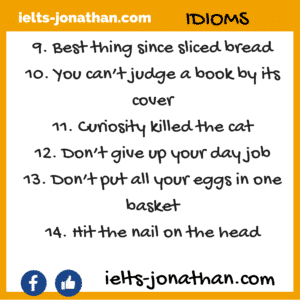Using Idioms in the IELTS Test
One of the things that separate native English speakers from those learning the language is the correct use of idioms.
In the IELTS speaking test they can really help boost your score, if used properly.
However, they can also lower your score, if you don’t use them correctly.
What are idioms?
An idiom is a group of words or phrase that through common usage has a meaning that is not clear from the words themselves.
Why use an Idioms?
Idioms are part of natural speech and probably occur in all languages. For that reason the use of idioms, according to the IELTS Band Score, can improve the examiner mark in the IELTS exam?
Simply put, idioms are sentences, words or expressions that do not covey the literal meaning but can provide an analogy or a metaphor to resemble something else.
This is a high-level language feature.
Confused?
Using an outdated Idiom, we can look at its literal meaning.
“it’s raining cats and dogs”, does not mean animals are falling from the sky but simply, it is raining heavily.
Here are some more examples of outdated idioms I have heard and I recommend you don’t use;
Here are some more;
Using the Band Scores, I can tell you that the correct use of Idioms in the IELTS Speaking Test can result in a band score of 7 or higher.
So what about tips?
Using Idioms Tip Number 1
Use an idiom is not just to use the words.
While speaking, if you are a good user of English, you should be able to emphasize certain words, fluctuate your tone of voice and use body language and facial expressions the way you want the message to be conveyed.
I often see students attempt to use the idiom in a flat tone and with little expression which makes it seem very unnaturally placed in the sentence and will lower the accuracy score.
Using Idioms Tip Number 2
Do not use an idiom while speaking or writing in IELTS Exam, unless you have a full understanding of it.
In writing, unlike the verbal emphasis, the examiner will consider the tone of the writing and the structure used in the sentence. An idiom used incorrectly, will immediately stand out.
Using Idioms Tip Number 3
In IELTS Writing, try to restrict the use of Idioms only to informal writing, so the General Training paper only, specifically, writing a letter. You still need to be careful, as the tone of the letter matters.
Using informal idioms when complaining about a service, for example, will be noticeable and you could be penalised.
Summary of using idioms
Scoring a band score of 7 or more doesn’t only depend on the use of idioms, there are also other factors that play a part, such as fluency, accuracy and coherence.
The examiner doesn’t award scores for candidates who have learn’t an idiom, but more a person who can use the language around them well.
If you don’t understand them, just don’t bother to use them in the exam otherwise you risk losing marks.
If you are interested raising your score in the IELTS Speaking Test, here are a few common idioms you could employ.
Over the moon – to be extremely happy or pleased. She was over the moon when she heard the news.
A piece of cake – very easy. The speaking test should be a piece of cake.
Burn the midnight oil – to stay up late. I’ll have to burn the midnight oil to finish this report for tomorrow.
Found my feet – to be comfortable in a situation. New students at university often find their feet within a few weeks
Under the weather – to not feel well. I had a cold and I still feel a bit under the weather.
Go the extra mile – to make a special effort. Are you willing to go the extra mile for the company?
Call it a day– to end the work/study/task for the day. I’m exhausted, I can’t study anymore. I’m going to call it a day.
Set in their ways– stubborn, not ready to change. The older generation are generally quite set in their ways.
Cost an arm and a leg– quite expensive. If you buy those shoes now, they will coat you an arm and a leg, wait until the sales start.
So, these were some of the commonly used idioms you can apply in the IELTS Exam.
Remember, it’s not necessary to use any idiom unless it perfectly fits in the sentence, and is fluently spoken.
Remember, you don’t have to try to become a master, when you’re not natïve.
I’m Jonathan
I’ve taught IELTS and University English in more than a dozen universities and schools around the world.
I’m a parent, traveller and passionate about language teaching and helping students achieve their dreams.
Whilst living in Austria or working in Asia, I run IELTS courses to help students get to where they want to be.
If you are serious about IELTS, connect with me to see how I can help you.







